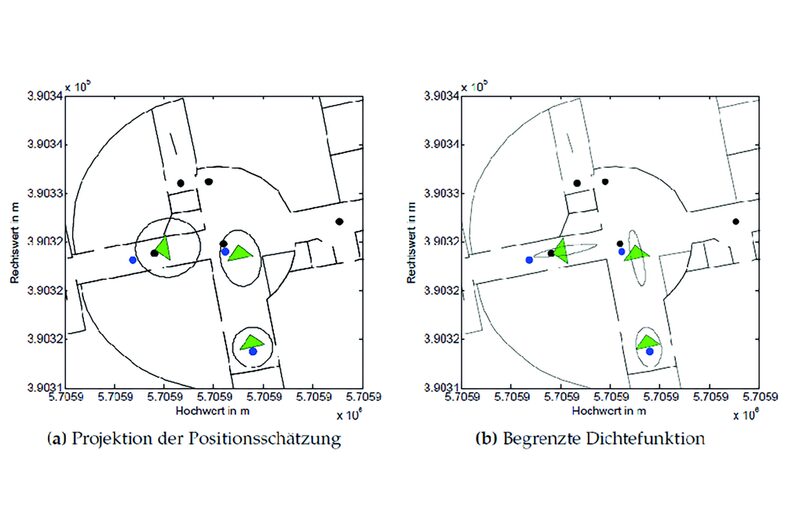Julian Lategahn's dissertation focuses on the localization of people in buildings. He is investigating algorithms for integrating map information into the positioning process in order to improve its accuracy. Background: The satellite navigation systems normally used inside buildings cannot be used due to signal attenuation. Other radio technologies are therefore often used for localization. The information provided by these technologies is generally subject to stochastic measurement errors and is usually fused with information from other, often complementary, sensors in Bayesian state estimators. These include, in particular, inertial sensors, which provide relative information on the movement of an object or person. The integration of map information into state estimators to improve position estimation has been little investigated so far.
In his dissertation, Mr. Lategahn is developing a novel localization system for indoor environments. The algorithms developed systematically incorporate map information into the position estimation and can still be run in real time on standard smartphones. Technologically, Lategahn is based on Bluetooth Low Energy wireless technology, which is available in current smartphones. However, the algorithms developed are not limited to this technology.
Both Cartesian and topological building maps were used and integrated into probabilistic state estimators. Mr. Lategahn was able to show through extensive experimental investigations in two buildings at Fachhochschule Dortmund that the localization system he developed is suitable for the accurate navigation of people within buildings and requires a relatively small number of installed beacons.
Julian Lategahn successfully defended his dissertation in July 2018. The doctoral examination was carried out in cooperation with Prof. Dr.-Ing. Michael Gerke from the FernUniversität in Hagen. The dissertation is available online via the document server of the FernUniversität in Hagen (DOI: 10.18445/20180824-220948-0).
Julian Lategahn studied computer science at the Fachhochschule Dortmund, first with a diploma and then with a master's degree. At the same time, he worked first as a research assistant and later as a part-time research assistant on various research projects. After completing his master's degree, he worked as a research assistant in several third-party funded research projects in the Intelligent Mobile Systems Lab (IMSL) working group under Prof. Dr.-Ing. Christof Röhrig while working on his doctorate.

Appraiser
- Prof. Dr.-Ing. Christof Röhrig (IDiAL, Fachhochschule Dortmund)
- Prof. Dr.-Ing. Michael Gerke (Faculty of Mathematics and Computer Science, University of Hagen)
